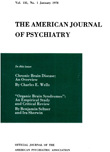THE ANTIDOTAL ACTION OF SODIUM SUCCINATE IN THE MESCALINE PSYCHOSIS
Abstract
1. Sodium succinate was found to have a definite antidotal effect on the mescaline psychosis in each of 12 subjects.
2. The effect varied greatly in different subjects. Moreover, the effect was rather transient and there was little shortening of the total duration of mescaline effect.
3. The most plausible hypothesis of the succinate effect is that succinate provides a substrate for oxidation in the brain tissues when the oxidation of other substrates, e.g., glucose, lactate and pyruvate has been depressed by the mescaline.
Access content
To read the fulltext, please use one of the options below to sign in or purchase access.- Personal login
- Institutional Login
- Sign in via OpenAthens
- Register for access
-
Please login/register if you wish to pair your device and check access availability.
Not a subscriber?
PsychiatryOnline subscription options offer access to the DSM-5 library, books, journals, CME, and patient resources. This all-in-one virtual library provides psychiatrists and mental health professionals with key resources for diagnosis, treatment, research, and professional development.
Need more help? PsychiatryOnline Customer Service may be reached by emailing [email protected] or by calling 800-368-5777 (in the U.S.) or 703-907-7322 (outside the U.S.).



